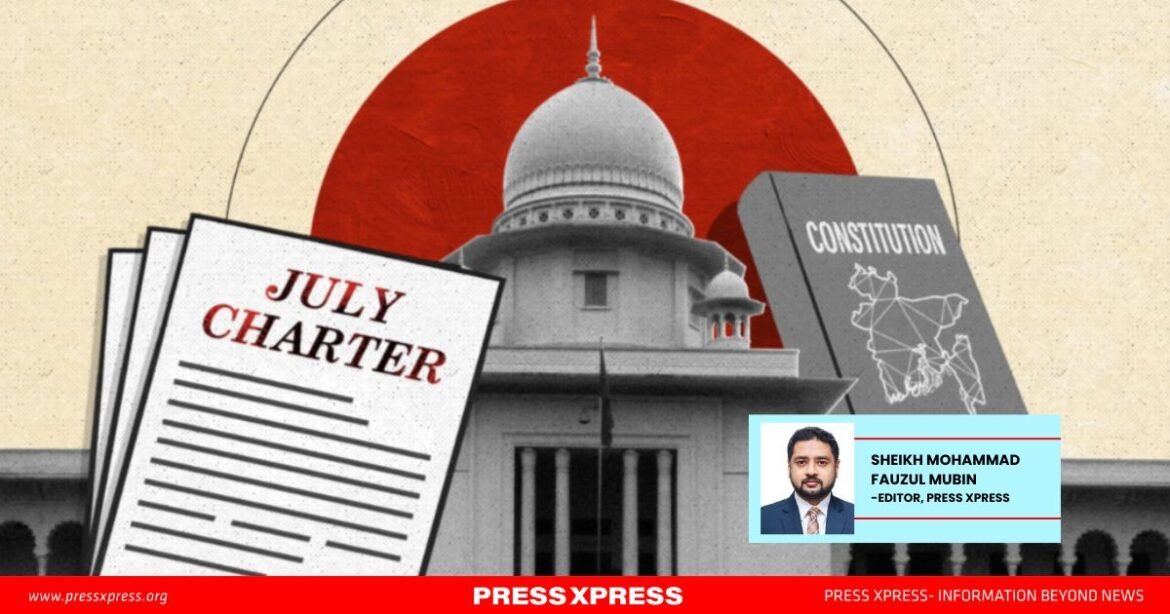A Charter Born of Uprising, Not of Consensus
The July National Charter 2025 emerged in the aftershocks of the July–August 2024 street unrest—hailed by its drafters as a ‘people’s revolution’ but in reality a fragile political coalition stitched together by convenience. Under the banner of ‘national consensus,’ 33 parties—including hard-right Islamist factions and dormant ultra-left platforms—proclaimed a blueprint to rewrite the Constitution, replace the current electoral model, and dilute central authority. The document romanticizes ‘republic reconstruction,’ yet it inadvertently reopens the very fractures Bangladesh spent five decades trying to seal.
Re-opening the Caretaker Pandora’s Box
At the heart of the Charter lies the resurrection of the caretaker government system. Its elaborate procedure—multi-tiered selection committees, ranked-choice voting for the Chief Adviser—resembles a bureaucratic maze more than a democratic safeguard. Bangladesh tried this formula once. The experiment collapsed under the 1/11 crisis of 2007, when unelected technocrats and military intermediaries suspended politics in the name of ‘neutrality.’ Reviving it today risks repeating that paralysis. Elections belong to citizens under constitutional continuity, not to interregnum regimes that invite international meddling at the most decisive moment of sovereignty.
The Mirage of Bicameral Checks
Another centrepiece of the Charter is a two-chamber Parliament—a lower house plus a 100-member Senate elected through proportional representation. In theory, such structures deepen deliberation; in Bangladesh’s volatile party ecology, they amplify fringe groups and clerical outfits that cannot win constituencies but can now bargain nationally through the Senate list. Instead of efficiency, bicameralism could breed gridlock, duplication, and escalating cost—a luxury for neither a developing economy nor a disaster-prone state that depends on rapid policy execution.
Weakening the Shield of the Republic
Proposals to repeal Articles 7A and 7B, which criminalize unconstitutional power seizure, are justified in the Charter as ‘restoring flexibility.’ In truth, they remove the hard-earned firewall against coup culture. A nation that endured the assassinations of 1975 and repeated extra-constitutional detours cannot afford to lower its constitutional defenses under the illusion of ‘inclusivity.’
Emergency Powers in a Vulnerable Geography
Bangladesh’s governance must be judged against geography, not ideology. A deltaic nation facing cyclones, floods, and border insurgencies needs swift emergency powers—subject to judicial review but operationally decisive. The Charter’s move to tighten emergency declarations under vaguely defined ‘civil-rights’ conditions risks rendering the state powerless during a crisis. Human rights cannot thrive amid humanitarian chaos.
Fragmentation Through Oversight Inflation
The document proposes new or constitutionalized bodies—Judicial Appointment Commission, Police Commission, Ombudsman, sectoral Public Service Commissions, and an elevated Anti-Corruption Commission. While oversight is essential, proliferation breeds paralysis. Competing jurisdictions blur accountability and slow service delivery, deterring investors and eroding citizens’ trust. Reform must simplify governance, not drown it in alphabet soup.
The Perils of Unguarded Decentralization
True local empowerment requires trained cadres, transparent budgeting, and digital auditing. The Charter’s blanket transfer of fiscal and administrative powers to local bodies—without prior capacity benchmarks—may decentralize not democracy but corruption. Local autonomy cannot precede local accountability.
The Return of the Religious Bargain
Perhaps most concerning is the ideological composition of the Charter’s signatories. Groups that once marched against women’s education and minority rights now champion ‘national reconstruction.’ Proportional-representation politics offers them a legitimate highway into the mainstream. This is not inclusion; it is laundered extremism. Bangladesh’s secular constitutional identity—the foundation of its social harmony and foreign policy—stands at risk of dilution.
Geopolitical Blind Spots
In the age of Bay-of-Bengal energy rivalry and Indo-Pacific competition, the region’s stability hinges on Dhaka’s agility. Fragmented governance under caretaker regimes and bicameral bargaining would project indecision to allies and adversaries alike. Strategic coordination—on ports, digital security, counter-terrorism, and disaster response—demands a unified command, not a divided republic.
A Constructive Alternative
Bangladesh can and should reform—within the Constitution, not against it. Key steps include: modernizing the Election Commission with biometric audits; digitizing accountability through e-procurement and asset declarations; phased decentralization tied to capacity; codified emergency powers with judicial oversight; and financial transparency to firewall extremism. Such targeted reforms reinforce democracy without disarming the state.
From Reform to Resilience
The July National Charter 2025 mirrors noble frustration with corruption and stagnation. Yet in its ambition to reset everything, it risks breaking the scaffolding that holds Bangladesh together. True reform is evolutionary, not revolutionary; institutional, not impulsive. Bangladesh’s story is one of defiance—of famine, of extremism, of fatalism. Its next chapter must defend that legacy, not gamble it on experiments that history has already rejected.


